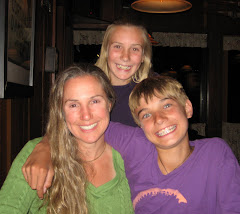For this assignment, I interviewed a good friend who is a gifted and inspiring teacher of 2nd and 3rd grade public school students in California. Her teaching philosophy is rooted in the Whole Language movement, with a focus on high-quality literature and integration of literacy skills into all areas of the curriculum. With a mixed grade classroom, she is a proponent of small reading groups and shared reading, with an emphasis on reading for meaning and building and sharing connections, which the children journal about in their "literature logs." She highly recommended The Reading Teacher as a source for literature study ideas.
In my friend's classroom, the school supplies the books, which I find interesting, since in DC it seems that teachers are required to build their own libraries from scratch, for the most part. She characterized her library as reflecting diversity of ideas as well as of authorship and characters, but she did say that her primary focus is always on high-quality literature, with diversity playing only a secondary role in book selection.
My friend's mother was a longtime kindergarten teacher in Phoenix before her recent retirement. One of the things that she did with her students was to send books home with children, along with a list of questions to begin discussing with parents. The goal, central to the Whole Language approach, was to stimulate a love of literature and to build a positive foundation of questioning and discussing books in the search for meaning. A concern that I have with this sort of approach is whether, in a socioeconomically diverse community, it has the potential for exacerbating the built-in head start that certain children have when their families place a premium on education and are in a position to offer this sort of after-school support. In DC there would certainly be many students whose parents would not be able to participate in this kind of activity, and it seems important to me to maximize the learning that occurs within the school environment, where children are more ostensibly on an equal footing in terms of their access to resources, including adult time.
As I look forward, towards the time when I have my own classroom, I know that I will strive to the greatest extent that I can, consistent with the needs of the curriculum, to incorporate the many insights and lessons of the Whole Language philosophy, which, interestingly, shares with the Critical Literacy movement a broad view of "text." As I discussed in my banned books entry, I view literature as a powerful tool in shaping ideas -- much more so than the cold pages of textbooks. While Tarry Lindquist makes a powerful case in Seeing the Whole Through Social Studies for relying more heavily on nonfiction, as a way of integrating learning and creating cross-curricular connections, as a writer, I would be very sorry to see fiction leave the classroom. Like my friend, my first priority in book selection would always be to choose high-quality literature, which is apt to be more motivating to students as well as to offer richer, more multifaceted opportunities for learning and teaching. I have come to see in this class, however, that it will be critically important not only to talk about issues of authorship and positioning but also to offer children regular exposure to literature that reflects their experience in a meaningful way, which is consistent with Constructivist teachings. Diversity will accordingly also be an important consideration as I build my classroom library.
Wednesday, October 29, 2008
Subscribe to:
Post Comments (Atom)

No comments:
Post a Comment